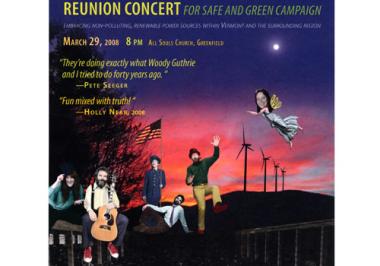Just over the Massachusetts border in Vernon, Vt., the Vermont Yankee nuclear power plant is showing signs of age. Last summer the Advocate published photos of a collapsing cooling tower at the plant and of an interior pipe patched with duct tape—pictures taken by an anonymous photographer, probably a plant worker who risked his or her job to take them.
Yet the federal Nuclear Regulatory Commission two years ago gave the plant a license to operate at 120 percent of the output it was designed for, and now the plant's owners, Entergy of Mississippi, are petitioning the NRC to renew the plant's operating license so it can stay on line from 2012—the end of its originally projected 40-year life—for another 20 years, until 2032.
But the NRC isn't the only actor in the picture. Two years ago the state of Vermont passed a law, Act 160, allowing it to veto the license extension. Now a movement is afoot to persuade the Vermont Legislature to do that, and a part of that movement is concentrating on towns within a 20-mile radius of the plant. It's called the Safe and Green Campaign, and it's started up a wave of local resolutions calling for the plant to shut down on time.
Meanwhile there are signs that the Vermont Legislature is taking a critical look at the plant. One example is the Senate Natural Resources and Energy Committee's consideration of a bill authorizing a search for a new location to store Vermont Yankee's radioactive waste. The plant's spent fuel pools are expected to be full soon—perhaps by the end of this year—and two years ago its operators got permission to store the spent fuel in dry casks on the property. Now, however, area residents and legislators are worried because the dry cask storage site would only be about 1.5 feet above the Connecticut River, and flooding is becoming a strong possibility as climate change continues.
Terrorism is another worry. It's estimated that if an airplane—even a small one—crashed into the existing spent fuel pool, an area stretching from northern New Hampshire to Boston, Providence, New Haven, Schenectady and Albany could become uninhabitable. Dry cask storage, which offers new possibilities to saboteurs, would require the constant presence of armed guards.
At press time 10 Massachusetts towns within 20 miles of Vermont Yankee—Buckland, Charlemont, Colrain, Conway, Gill, Heath, Leverett, Leyden, Montague and Wendell—had agreed to put the resolutions on the warrants for their town meetings in April and May. Groups supporting the Campaign are also forming in Brattleboro, Putney, Dummerston and other towns in southern Vermont.
To help raise money for the Safe and Green Campaign, Valley-rooted, nationally acclaimed Bright Morning Star will give a benefit concert on March 29th at 8 p.m. at All Souls Church, Greenfield. The concert will be signed for the hearing impaired. Tickets (adults $15, children under 12 $8) are available at World Eye Bookshop (Greenfield), Boswell's Books (Shelburne Falls), Everyone's Books (Brattleboro), Food for Thought Books (Amherst), and at the door ($18). For more information, call 413-863-8952. The Safe and Green campaign is sponsored by Citizens Awareness Network, New England Coalition on Nuclear Pollution and Nuclear Free Vermont.



